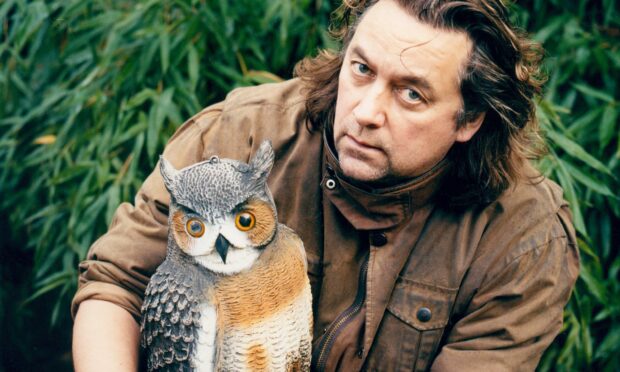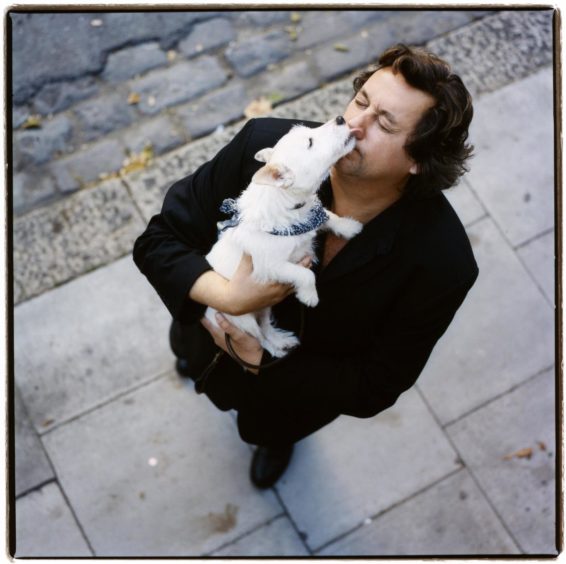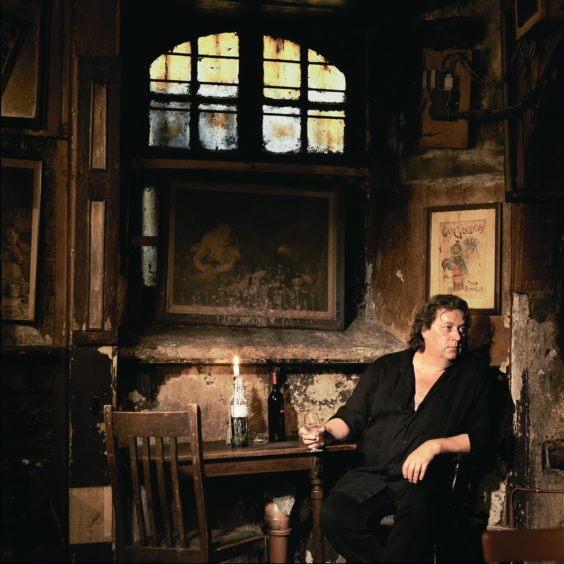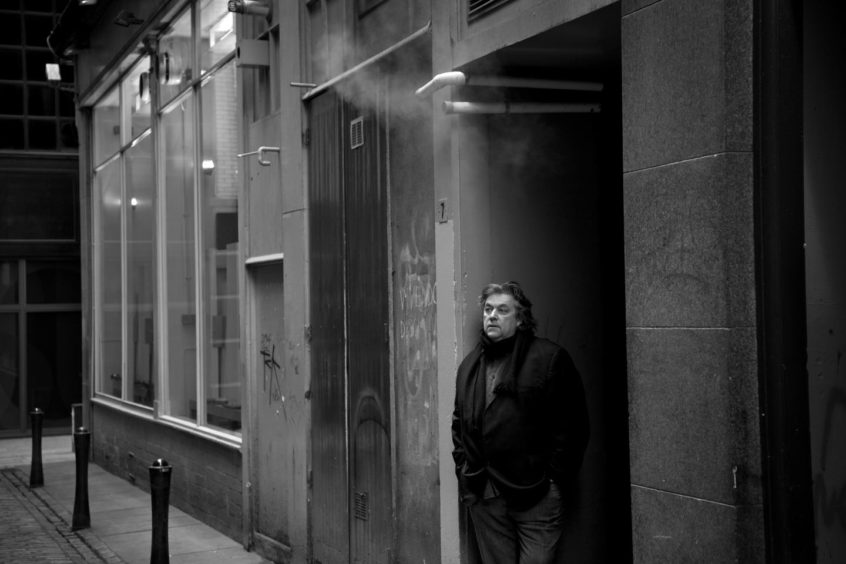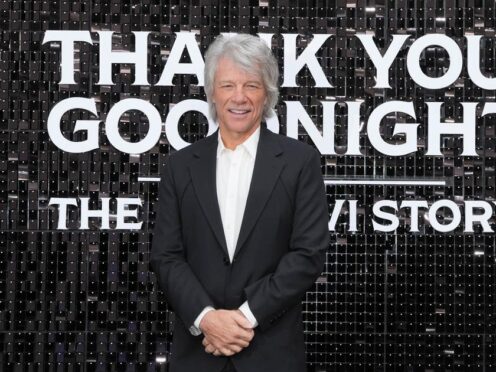“Jackie Leven always used to open his shows by saying that he came from Fife, the windiest part of the UK,” remembers Deborah Greenwood. “He says that when he was at school in the playground and the wind stopped blowing all the kids fell over.
“He was very proud of it – every show that we did, he always had to be introduced as ‘Jackie Leven from the Kingdom of Fife’. It was very, very important to him.”
For the final decade and a half of his life, Greenwood was the partner of the extraordinary – but relatively little-known – singer-songwriter Jackie Leven, who was born in Kirkcaldy in 1950 and went to the town’s High School at the same time as Gordon Brown.
Unsung great of Scottish music
She’s speaking now, nearly 10 years after Leven died of cancer, because a new collection of his work named Straight Outta Caledonia… The Songs of Jackie Leven has just been released on the Glasgow label Night School Records.
It deserves to reintroduce one of the unsung greats of Scottish music – who occupied the group between folk, rock, blues and country in singular style – to a whole new audience.
“When I heard the first song on this compilation, The Sexual Loneliness of Jesus Christ, it was one of those epiphany moments you have as a pure fan,” says Michael Kasparis, who runs Night School and records his own music under the name Apostille.
His first listen to Jackie Leven came on a road trip to a gig in Manchester with his friend and label signing Molly Nilsson, who asked an oblivious Kasparis if he’d ever heard of Leven before putting some music on.”
“I hadn’t, which was funny, as Molly’s from Sweden and lives in Berlin, and I’m from 50 miles away from where Jackie lived,” says Kasparis.
‘I can’t believe he’s doing this’
“It helps when you have someone who’s really enthusiastic guiding you through (music you hear for the first time), so we listened to it, and at every part of the song I thought, I can’t believe he’s doing this.
“The lyrics, of course, are just so rich and brave in their subject matter, there’s a soaring chorus, and even just the two-note mandolin solo on it, the way it keeps going.
“Everything about it for me was just perfect, it blew me away, but I couldn’t imagine anything else he’d done being that good. He’s got something like a 35-album catalogue as well, so it was quite daunting.”
Straight Outta Caledonia
The purpose of Straight Outta Caledonia, then (the title is another of Leven’s songs, which Kasparis loves simply because it’s a reference to the rap group NWA’s Straight Outta Compton), is to try and recreate the same experience Kasparis had listening to that tape, and subsequently dipping into Leven’s work over the following couple of years.
The record is by no means comprehensive, but rather it’s a selection of Kasparis’ favourites, whittled down from all the “just incredible” songs he discovered on each new album.
“If I hadn’t heard about Jackie’s music, and I’m someone who’s in the music industry and surrounded by this stuff my whole life… I just couldn’t believe he wasn’t as successful or well-known, with a legacy on a par with the big Scottish writers,” says Kasparis.
“It was a voyage of discovery for me, and I had the idea for the project purely based on the idea that if I hadn’t heard of him, then loads of other people hadn’t either, and his music brought so much to my life that I wanted to share it.”
While she was with Leven, Greenwood witnessed the bulk of his later-career resurgence, following his 1994 return with his Songs from the Argyll Cycle EP.
By this point Leven was in his mid-forties, and he had already experienced a musical career that’s about as interesting as they come, while also flying entirely under the radar.
In 1971, barely into his twenties, Leven’s first record was a folk album named Control, released under the alias John St Field. In the late ‘70s and early ‘80s he founded the London-based New Wave group Doll by Doll, who released four albums and a live record with critical but no commercial success.
Dave Gilmour on guitar…
The group split in 1983, and nearly three decades later unreleased recordings featuring Pink Floyd’s David Gilmour on guitar were unearthed.
From 1984, while recording what was to have been his debut solo album, Leven experienced a wilderness decade.
Badly injured by a street attack in Fife and unable to sing, he developed a heroin addiction which he eventually kicked with the help of his wife Carol, with whom he set up a recovery treatment charity.
During this time, however, he briefly toured and recorded with former Sex Pistol Glen Matlock’s band Concrete Bulletproof Invisible.
‘The cult artist’s cult artist’
“He’s often described as the cult artist’s cult artist,” says Greenwood.
“Lots of people in the music business, especially singer-songwriters and some people in bigger bands, say ‘yeah, we knew of Jackie, great singer’ or ‘great writer’. But in his lifetime he really wasn’t recognised widely, he was only recognised by the cognoscenti, shall we say.
“He was recognised much more so in Germany and Scandinavia than here, but from the introduction Michael’s given, I think that recognition is coming. Especially in Scotland, he’s really a national treasure and it would be great if people could find out more about him.”
From what she knows, Leven was a large and boisterous Fife teenager who had a troubled time at school in the 1960s, but his regular banishment to the library meant that an encouraging librarian got him interested in reading, beginning with the Silver Age Russian poets.
“The school did a lot for him, possibly in a way that he didn’t know it was doing it,” says Greenwood.
“He spent a lot of time in the Fife landscape as well, when he wasn’t at school he used to just go off and sit in the fields.
“If you read his lyrics, some images there are so strong, and they’re to do with open sky, with reservoirs, with images of the weather, and with the hills particularly.
“His songs aren’t townscapes, they’re big countryscapes, and I think they came from Fife. Also, a lot of his songs look at individuals, at Fife people.
“A lot of his stories were inspired by the people that he knew growing up, and the experiences he had. One song was called Jim o’ Windygates, for example.
“He saw things in images, all of his songs, and painted pictures of what got into his head.”
An abiding love for Fife
Greenwood explains more about Leven’s love of and pride in his Fife roots.
“It wasn’t just the heritage, I think it was more than that. It was in his bones, it was so much a part of his growing up, and it gave him a real love for the minutiae of nature.
“You could be sitting outside, and he would really notice the bird or the worm or the tree or whatever it was that was in his view, whereas other people might just have passed over it. He adored all that kind of detail.”
Kasparis returns to describing his own love of the detail and quality in Leven’s songwriting.
“As a singer and a storyteller, he didn’t leave anything out,” he says. “He just seemed to put everything he had into every moment of a song.
“Everything was done with this full-of-life attitude – in a lot of ways it’s similar to soul music. I’m not going to compare him directly, but when you listen to Otis Redding, and you feel like they’re giving everything,
“Jackie did that with not just his singing. Even the most tender parts, he was going to be as tender as he possibly could.
Collaborated with Ian Rankin
Leven famously collaborated with friend and fellow Fifer Ian Rankin on the 2005 album Jackie Leven Said, and Kasparis compares his musical spirit to another group from the Kingdom, Big Country; or perhaps the Waterboys and Bert Jansch, as well.
“He was like a force of nature,” he says. “I never saw him live, but from what I’ve heard his gigs featured him chatting like a proper troubadour, a consummate storyteller that’s poured everything into it.
“When you get a sad song, it’s devastating, but when you get a funny moment, it’s laugh out loud.
“The music could be blues-based or country-based, some of it sounds like big stadium rock, but he’s always got this no-holds-barred nature.
“He’s not scared to be uncool. A lot of his songs are about vulnerable masculinity, and especially in the environment he was operating in,
“I think a lot of those qualities were rare. It’s just really human, and that appeals to me a lot.”
Straight Outta Caledonia… The Songs of Jackie Leven is out now on Night School Records’ archival imprint School Daze. See jackieleven.bandcamp.com
